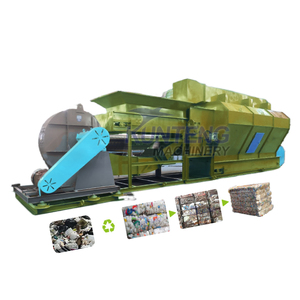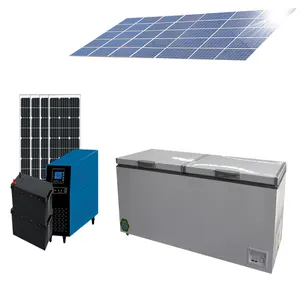Popular in your industry



























































Related Searches:
























































































































Top categories
About industrial garbage disposal
Introduction
As the world grapples with the escalating challenge of waste management, the industrial sector is poised to lead the way in revolutionizing how we handle garbage. This article delves into the current state of industrial waste management, the challenges it faces, and the environmental impact of industrial waste. It also explores the innovative technologies and strategies that are transforming the sector, and the role of policy and regulation in shaping its future. The focus is on a shift from a linear 'take-make-dispose' model to a circular economy, where waste is viewed not as a problem, but as a resource.
The Current State of Industrial Waste Management
As our global population surges and urbanization accelerates, the challenge of managing waste becomes ever more pressing. The waste management industry is at the forefront of pioneering sustainable solutions. It's not just about disposing of what we discard, but rethinking our entire approach to resources, lifecycle, and impact. Addressing growing environmental concerns, governments and international organizations are amplifying their regulatory measures within waste management. These enhanced regulations stretch beyond traditional waste disposal, pushing companies to adopt a 'cradle to grave' philosophy, emphasizing accountability throughout a product's lifecycle.
Challenges in Industrial Waste Management
Industrial waste management faces several challenges. Inadequate collection and disposal infrastructure often lead to environmental issues and disease outbreaks. Financial constraints, especially in developing countries, hinder the implementation of effective waste management programs. Resistance from localities, ineffective recycling or composting, and the impact of climate change further complicate waste management. The lack of technological advances results in inefficiencies, while changing consumer preferences increase waste generation. Lastly, unclear regulations create confusion in the waste management industry.
Environmental Impact of Industrial Waste
Industrial waste, both hazardous and non-hazardous, contributes significantly to environmental pollution. When released into the environment, these wastes cause air, soil, and water pollution. Particularly, water pollution is devastating, often leading to eutrophication, a process that promotes the growth of toxic algae and plants, increasing carbon dioxide levels in water, and decreasing biodiversity. Industrial waste accelerates this process, impacting drinking water, fisheries, and recreational waters.
Innovations in Industrial Waste Management
Innovations in industrial waste management are revolutionizing the sector. Technologies like smart waste bin monitoring systems that provide real-time fill-level information are enhancing efficiency. AI-powered recycling robots are improving waste sorting, while pneumatic waste pipes offer a practical solution for densely populated urban areas. Solar-powered trash compactors increase the capacity of waste containers, and specialized kiosks provide a safe disposal method for electronic waste. Lastly, recycling apps are emerging as a valuable tool for individuals and businesses to navigate the world of recycling.
Emerging Technologies in Waste Disposal
Emerging technologies are revolutionizing industrial waste management. Smart waste bin monitoring systems provide real-time fill-level information, optimizing waste collection. AI-powered recycling robots differentiate materials for efficient waste sorting. Pneumatic waste pipes transport waste directly to processing centers, reducing garbage truck emissions. Solar-powered trash compactors increase dumpster capacity, reducing collection frequency. Specialized kiosks facilitate safe disposal of electronic waste, while recycling apps guide individuals and businesses in sustainable waste disposal.
Case Studies of Successful Waste Management Strategies
Several successful waste management strategies have been implemented in industries. For instance, creating a 'green team' to strategize and monitor waste measures has proven effective. Measuring waste has allowed companies to focus on areas producing the most waste. Segregation of recyclable waste, easy disposal systems like waste chutes, and composting are other successful strategies. Some companies have even initiated waste exchange programs, turning their waste into valuable resources for other companies. Using greener chemicals, buying in bulk, and rethinking packaging are also strategies that have yielded positive results.
The Future of Industrial Waste Management
The future of the waste management industry is likely to be driven by automation and the circular economy. Smart waste management software solutions are on the rise, optimizing routes for waste management vehicles. For instance, advanced route planning tools allow scheduling of multi-stop waste collections and finding the fastest routes. This software can also re-assign routes if a driver isn't available, reducing extra work hours. These advancements indicate a future where waste management becomes more efficient and sustainable, driven by innovative technologies.
Predicted Trends in Waste Management
The future of waste management is predicted to be driven by several key trends. Recycling and reuse are growing, with businesses developing models to prevent waste generation. Waste-to-energy technology is advancing, converting waste into energy through processes like incineration or gasification. The demand for a circular economy is increasing, with companies designing products for longer use and minimal waste. Intelligent waste management solutions are emerging, using AI and data analytics to optimize operations. Regulations are growing, with governments enforcing recycling mandates and waste disposal bans. Lastly, collaborative efforts are expanding, with partnerships between stakeholders improving waste management methods.
Role of Policy and Regulation in Shaping the Future
Policy and regulation play a crucial role in shaping the future of industrial waste management. Companies actively engage in policy discussions, ensuring compliance with domestic and international laws. They support policies that promote renewable energy and the production of fuel from renewable sources. These companies also advocate for life cycle approaches in waste management, viewing waste as a resource rather than a problem. They are actively involved in public dialogues surrounding recycling and its potential for GHG reduction. This highlights the importance of policy and regulation in driving sustainable practices in industrial waste management.
Conclusion
The future of industrial waste management is set to be shaped by a combination of innovative technologies, sustainable strategies, and robust policy and regulation. The industry is moving towards a circular economy model, where waste is minimized and resources are reused, driven by advancements in AI, data analytics, and waste-to-energy technologies. However, the road ahead is not without challenges, from infrastructure and financial constraints to regulatory complexities. It is crucial that all stakeholders - from governments and businesses to consumers - collaborate to overcome these hurdles and make the vision of sustainable, efficient, and effective waste management a reality.






































